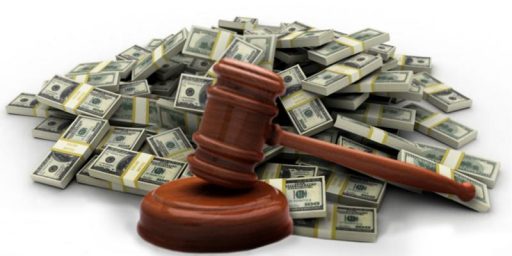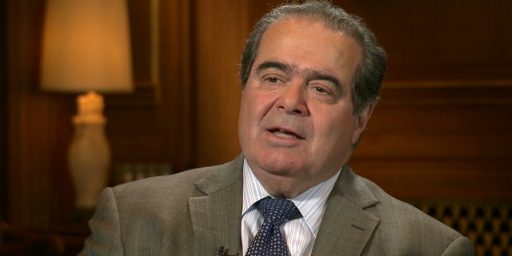Supreme Court Upholds Virtual Child Porn Law
The Supreme Court today upheld, by a 7-2 vote, controversial provisions of a child pornography law that made it illegal to promote material presented as child pornography even if the material in question isn’t actually child pornography. Or involve actual children.
The ruling upheld part of a 2003 law that also prohibits possession of child porn. It replaced an earlier law against child pornography that the court struck down as unconstitutional. The law sets a five-year mandatory prison term for promoting, or pandering, child porn. It does not require that someone actually possess child pornography. Opponents have said the law could apply to movies like “Traffic” or “Titanic” that depict adolescent sex.
But Justice Antonin Scalia, in his opinion for the court, said the law does not cover movie sex. there is no “possibility that virtual child pornography or sex between youthful-looking adult actors might be covered by the term ‘simulated sexual intercourse.'” Scalia said. Likewise, Scalia said, First Amendment protections do not apply to “offers to provide or requests to obtain child pornography.”
Justice David Souter, joined by Justice Ruth Bader Ginsburg, dissented. Souter said promotion of images that are not real children engaging in pornography still could be the basis for prosecution under the law. Possession of those images, on the other hand, may not be prosecuted, Souter said. “I believe that maintaining the First Amendment protection of expression we have previously held to cover fake child pornography requires a limit to the law’s criminalization of pandering proposals,” Souter said.
The particular case-in-controversy:
Authorities arrested Michael Williams in an undercover operation aimed at fighting child exploitation on the Internet. A Secret Service agent engaged Williams in an Internet chat room, where they swapped non-pornographic photographs. Williams advertised himself as “Dad of toddler has ‘good’ pics of her an me for swap of your toddler pics, or live cam.” After the initial photo exchange, Williams allegedly posted seven images of actual minors engaging in sexually explicit conduct. Agents who executed a search warrant found 22 child porn images on Williams’ home computer.
Williams also was convicted of possession of child pornography. That conviction, and the resulting five-year prison term, was not challenged.
Theoretically, people could go to jail for distributing otherwise legal pornographic materials if they lead people to believe that minors are involved. Or if it contains computer-generated images depicting virtual children, so long as they’re advertised as children. Or, if there are no materials whatsoever exchanged or in possession of either party but the person requesting the materials merely believes there is some child porn involved.
All of these circumstances, theoretically at least, are problematic. Actually skimming the opinions in the case, U.S. v. Williams [PDF], though, makes it hard to get particularly upset with the infringements on liberty imposed by the law. Frankly, it’s hard to read through the list of prohibited materials without cringing.
Further, the law is pretty tightly written, objections that mainstream movie could violate its provisions notwithstanding. It imposes a multi-pronged test that ensures it’s not used to prosecute people who aren’t actively seeking truly objectionable materials.






I don’t like child pornography.todays child will build our future so we should keep children far from this porn for their proper develop.
So it’s more like “conspiracy to possess”, rather than actual possession? I wonder, is it illegal to sell oregano, if you’re telling people it’s actually marijuana? Is it illegal to buy oregano when someone is telling you it’s marijuana?
Child pornography is dangerous for a number of reasons, not the least of which is how developmentally challenged sexually abused children are. Laws should absolutely protect young children from pedophiles and people who seek to abuse children sexually. Many of those children abused go on to abuse others and even go on to a life of crime. There needs to be constitutionality to the law, but protecting the kids in this instance is vital.
joe,
I think you missed the point of this topic. This law isn’t punishing people for the abuse of minors, it’s punishing people for marketing adults, or virtual representations, as children in a pornographic context. This does not cover any pornography involving actual children.
Hooray, now if we could just get a legal definition of pornography we’ll be all set!
(crickets chirp)
What, was that asking too much?
Seriously, I’m no advocate of child porn or the people who like to view it, but I would like to see something a but more substantial than “well this person was maybe interested in obtaining something that looked like child porn” before convicting that person of a crime. I certainly need something more than “well this person was maybe interested in obtaining something that looked like child porn but was in fact not child porn.” Slippery slope.
What puzzles me is: if “bogus” child porn is passing as or substituting for the real thing, why on earth would you set up incentives that discourage that kind of substitution?
Michael: The issue is addressed in the decision and the answer is, ‘Yes’. Selling oregano while claiming it is dope is a felony.
Pages 14-15 of the decision, which can be found (as a 47-page PDF) at the Supreme Court website.
Anyone have any trouble guessing the 2 losing votes?